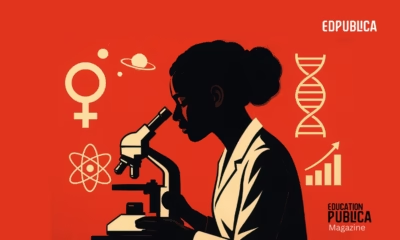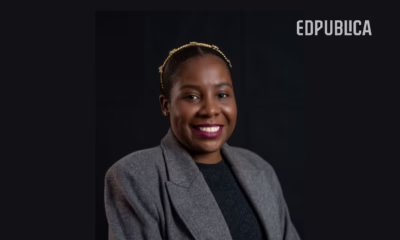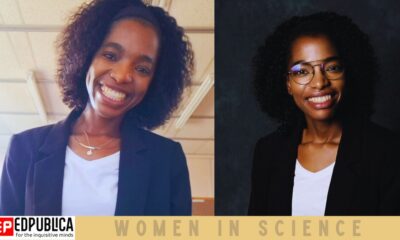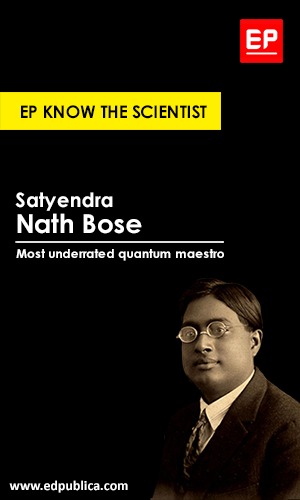EDUNEWS & VIEWS
Why We Must Challenge Stereotypes to Open Science Careers for Girls
Efforts should be made to raise awareness about the contributions of women in science and to challenge stereotypes that discourage girls from pursuing science careers

While there has been significant progress in increasing the participation of women in science-related disciplines, studies have confirmed that men continue to dominate science, technology, engineering, and mathematics (STEM) careers. Despite the gains in women’s participation in science careers in countries including South Africa, women remain underrepresented in these fields. This gender disparity is further heightened among Black women.
Although women represent the majority of young university graduates in South Africa, only 13% of STEM graduates are women, with Black women being significantly underrepresented in higher academic and research leadership positions. This can be attributed to systemic barriers such as gender bias, lack of mentorship, and limited access to resources, which continue to hinder true equality in science careers.
At our institution, the University of the Free State (UFS), there is an increasing commitment to support emerging researchers, especially women, through mentorship and research development opportunities. This is part of our institution’s Vision 130, which aspires to foster excellence in research and increase the impact of our scholars on the broader societal context. I am privileged to be one of the selected candidates in our institution’s Transformation of the Professoriate Mentoring Programme, which aims to grow a critical mass of excellent emerging scholars at the UFS. This programme equips all its candidates with both academic and research mentorship to advance their development towards assuming senior academic and research positions. More importantly, this programme supports candidates in accessing networking and funding opportunities, contributing to their establishment as researchers with the potential to create centres of research excellence in the future. My hope is that those of us who have access to such opportunities can also use our privilege and positions to mentor more women researchers from underrepresented groups in the various fields of science.
“Although women represent the majority of young university graduates in South Africa, only 13% of STEM graduates are women, with Black women being significantly underrepresented in higher academic and research leadership positions
To improve the participation of more women in science-related careers, it is crucial to address the systemic barriers that hinder their progress. This includes creating more mentorship and networking opportunities for women, providing financial support and scholarships for female students in science career fields, and implementing national policies that promote work-life balance and support for working mothers.
Additionally, efforts should be made to raise awareness about the contributions of women in science and to challenge stereotypes that discourage girls from pursuing science careers. Encouraging more inclusive and diverse work environments where women feel valued and supported is essential for increasing their participation and retention in science careers. There is also a need for progressive policies that promote the employment of Black women academics in positions of authority in STEM fields. This will ensure the availability of a diversity of women mentors and academics to offer gender-sensitive support to students.
(As told to Dipin Damodharan)
EDUNEWS & VIEWS
Teacher Strength in India Crosses One Crore for the First Time
India’s teacher count crosses one crore in 2024-25, improving pupil-teacher ratios and female participation amid changing student enrolment trends.

For the first time in India’s academic history, the total number of school teachers in the country has crossed the one crore mark in the academic year 2024-25. This milestone was highlighted in the Unified District Information System for Education Plus (UDISE+) report released by the Ministry of Education on school education.
According to the report, this represents a 6.7 percent increase in the teacher workforce compared to 2022-23. The data further reflects the scale of India’s education system, which now comprises nearly 15 lakh schools catering to over 24 crore students across the country.
The enrolment pattern shows that nearly 50 percent of students are studying in government schools, followed by 41 percent in private institutions, with the rest enrolled in government-aided schools. Encouragingly, female representation among teachers has risen to 54.3 percent, while girls’ enrolment has reached 48.3 percent.
Better student-teacher ratios and declining dropouts
One of the most significant improvements reported is in the Pupil-Teacher Ratio (PTR). At the foundational, preparatory, middle, and secondary levels, the ratios now stand at 10, 13, 17, and 21 respectively, showing marked progress in easing classroom loads for teachers.
The Ministry also reported steady gains in dropout rates, student retention, and Gross Enrolment Ratios, indicating that schools are doing more to support students and keep them in the education system. Special attention has also been given to phasing out zero-enrolment and single-teacher schools, with better infrastructure additions enhancing the overall schooling environment.
Highlighting the broader significance of these trends, the Education Ministry stated that the growing teacher workforce is a critical step in ensuring equitable access and quality in education. Increased teacher availability is expected to improve classroom engagement, reduce regional disparities, and help address learning gaps. Schools, the report noted, are now becoming “more supportive and responsive to students’ needs,” which has also contributed to a reduction in early dropouts and greater inclusivity.
With the teacher count crossing the one-crore landmark and school indicators showing a positive trajectory, the government emphasized that the coming years will focus on consolidating these gains and ensuring that every child in India has the opportunity to access quality education.
Currently, India’s school system serves around 24.7 crore students across approximately 14.7 lakh schools, aligning closely with official numbers but reflecting a slight decline in enrolment compared to previous years. The overall student enrolment in 2024-25 marks a seven-year low, falling by about 11 lakh students compared to 2023-24. This drop is notably pronounced at the primary level (classes 1 to 5), which alone saw a decline of roughly 34 lakh students from the previous academic year. Key states like Uttar Pradesh, Bihar, Rajasthan, West Bengal, and Maharashtra reported some of the steepest enrolment declines, contributing to this national trend.
Government schools now account for about 50 percent of enrolment, though some states have witnessed a significant shift of students from government to private schools. This shift has raised concerns about the government’s capacity to retain students in public schools, with efforts underway to address infrastructural and quality gaps.
On the positive side, there has been progress in girls’ education with girls’ enrolment hovering near 48 percent nationally. The Net Enrolment Ratio (NER) for girls at primary education stands at approximately 90 percent, indicating a high level of age-appropriate enrolment. The secondary and higher secondary levels have shown improvement as well, aligning with the National Education Policy’s target of universal enrolment by 2030.
EDUNEWS & VIEWS
India’s Dhirubhai Ambani School Ranked Among Top Global Highschools
Founded in 2003, India’s Dhirubhai Ambani International School is also one of the youngest schools to feature in the rankings.
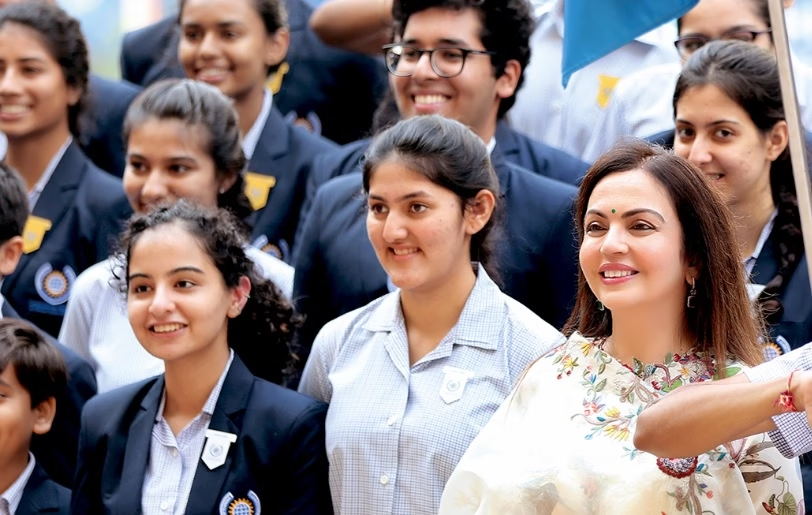
India’s Dhirubhai Ambani International School in Mumbai continues to shine on the global education stage, ranking fifth among schools outside the US and UK in the 2025 HSBC Hurun Education Global Highschools list. Founded in 2003, it is also one of the youngest schools to feature in the rankings.
The report emphasizes schools’ performance based on alumni university destinations, co-curricular development, and institutional reputation. With 190,000 students across the 180 ranked schools, only 0.6% of those listed are from India, underscoring the school’s elite standing.
In a media statement, Rupert Hoogewerf stated, “The list recognizes schools adding the most value to students’ futures. India’s presence through DAIS highlights the global competitiveness of select institutions in the country.”
Dhirubhai Ambani School joins a select group that includes Seoul International School, Chinese International School (HK), and Kolej Tuanku Ja’afar (Malaysia) in representing Asia outside China.
EDUNEWS & VIEWS
Global Highschool Rankings 2025: UK and US Dominate, China Rises
Among the standout institutions, Westminster School maintained its dominance with over 40% of graduates entering Oxbridge

In a global assessment of elite high schools, the HSBC Hurun Education Global High Schools 2025 report has named Westminster School in London as the world’s best high school for the third consecutive year. The annual ranking, now in its third edition, evaluates the top 180 independent schools across 11 countries based on university placements, co-curricular development, and institutional reputation.
The list reflects a shifting but still concentrated landscape of educational excellence. The United States and the United Kingdom together accounted for 85% of the world’s top highschools, with the US leading at 45% and the UK at 40%. However, China emerged as a strong contender, ranking third with 16 schools—up from 13 last year.
“The number of Chinese students studying abroad fell last year, but there are still nearly one million,” said Rupert Hoogewerf, Chairman and Chief Researcher of Hurun Education. “Interestingly, with 16 top-ranked highschools, Chinese families are finding viable options closer to home—avoiding time zone issues and maintaining cultural continuity.”
Among the standout institutions, Westminster School maintained its dominance with over 40% of graduates entering Oxbridge. St Paul’s School rose to second place, while The Dalton School in New York dropped to third. Notably, Winchester College returned to the top 10 and was named the world’s best boarding school, surpassing even Eton College and Phillips Andover.
“These rankings offer forward-looking insights for families planning their children’s international education,” said Kai Zhang, Head of International Wealth and Premier Banking, HSBC Asia, in a media statement. “Destinations like Hong Kong and Singapore are becoming increasingly attractive for their proximity and cultural alignment with Asian families.”
The report also revealed evolving trends in school environments and demographics:
>> 70% of the schools are co-educational, with a growing shift among historically boys-only UK schools admitting girls.
>> 51% offer boarding options, while half remain day schools.
>> The average school size was 1,050 students, with 140 graduating each year.
>> The average age of these schools is 204 years, with some—like King’s School, Canterbury—tracing roots back over a millennium.
Meanwhile, India’s Dhirubhai Ambani International School in Mumbai ranked 5th among schools outside the US and UK, continuing its position as a global outlier in quality private education from the subcontinent.
Despite steep tuition fees—averaging $63,000 annually for boarding schools—demand for places remains high. However, the UK’s recent addition of VAT on private school fees has prompted concerns, with schools like Winchester now costing over $80,000 per year.
Another key theme this year is the integration of creative thinking and AI literacy in education. “There is a real push toward STEAM, adding ‘Arts’ to STEM. Schools are under pressure to future-proof education and prepare students to thrive in the 2050s,” Hoogewerf added.
With data drawn from university destinations, co-curricular achievements, and alumni impact, the HSBC Hurun rankings offer more than a leaderboard—they reflect the evolving priorities and challenges in elite education worldwide.
-

 Space & Physics5 months ago
Space & Physics5 months agoIs Time Travel Possible? Exploring the Science Behind the Concept
-

 Earth6 months ago
Earth6 months ago122 Forests, 3.2 Million Trees: How One Man Built the World’s Largest Miyawaki Forest
-

 Space & Physics6 months ago
Space & Physics6 months agoDid JWST detect “signs of life” in an alien planet?
-
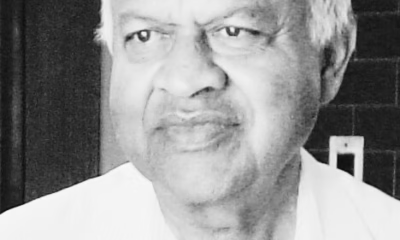
 Know The Scientist5 months ago
Know The Scientist5 months agoNarlikar – the rare Indian scientist who penned short stories
-

 Society4 months ago
Society4 months agoShukla is now India’s first astronaut in decades to visit outer space
-

 Society4 months ago
Society4 months agoAxiom-4 will see an Indian astronaut depart for outer space after 41 years
-

 Earth4 months ago
Earth4 months agoWorld Environment Day 2025: “Beating plastic pollution”
-

 Society6 months ago
Society6 months agoRabies, Bites, and Policy Gaps: One Woman’s Humane Fight for Kerala’s Stray Dogs

